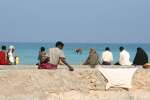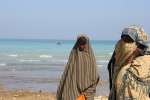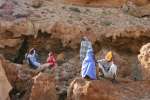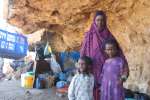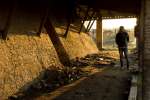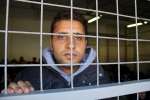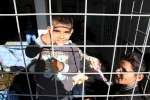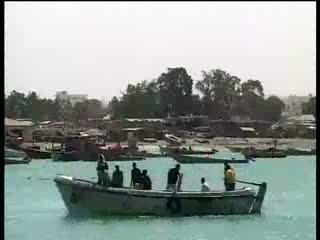UNHCR backs new Irish campaign against people smuggling
News Stories, 24 October 2008

DUBLIN, Ireland, October 24 (UNHCR) – The UN refugee agency has given its support to a campaign launched earlier this week by the Irish police and justice ministry to raise awareness about the trafficking of human beings. "Don't close your eyes to human trafficking," Irish Minister for Justice Dermot Ahern said on Tuesday in Dublin, echoing the theme of the campaign.
Posters of men and women in everyday situations wearing blue blindfolds are going up in the streets of Dublin and other urban centres to remind people that they should be vigilant and aware that the crime may exist in their communities. A hotline has been set up for people to report their suspicions in secret.
Although the extent of people trafficking to Ireland is not known, police believe that people are being brought into Ireland for sexual and labour exploitation. The UN refugee agency fears that small numbers of uprooted people in need of its protection – especially women and children – could be among the victims.
"Refugees are one example of a vulnerable group that traffickers can pick on. People trying to escape from war or persecution, often in desperate situations, take risks to leave their country. This puts them in a vulnerable position that can be exploited," said Manuel Jordão, UNHCR's representative in Ireland, who described human trafficking as "a poison in our society."
His thoughts were echoed by Ahern. "Trafficking in human beings is a form of modern slavery which has no place in our, or indeed in any, society," the Irish minister said, adding that "Ireland is committed, with our international partners, to taking a strong approach to combatting trafficking in human beings."
The Irish campaign follows a similar initiative launched last year in the United Kingdom. The two countries, together with Poland, Italy, Spain and the Netherlands, are members of a human trafficking initiative designed to ensure that the European Union becomes a more hostile environment for criminals engaged in people trafficking. All are running awareness campaigns this year.
UNHCR's Jordão said he believed asylum systems in Europe should be aware of how to identify and assist refugees who have been trafficked.
The Irish authorities have established an anti-trafficking unit which is working with non-governmental and statutory organizations to develop a planned response to trafficking issues in Ireland. UNHCR is working with the committee to promote ways of helping trafficking victims who might need legal advice or counselling about asylum applications.
By Steven O'Brien in Dublin, Ireland




